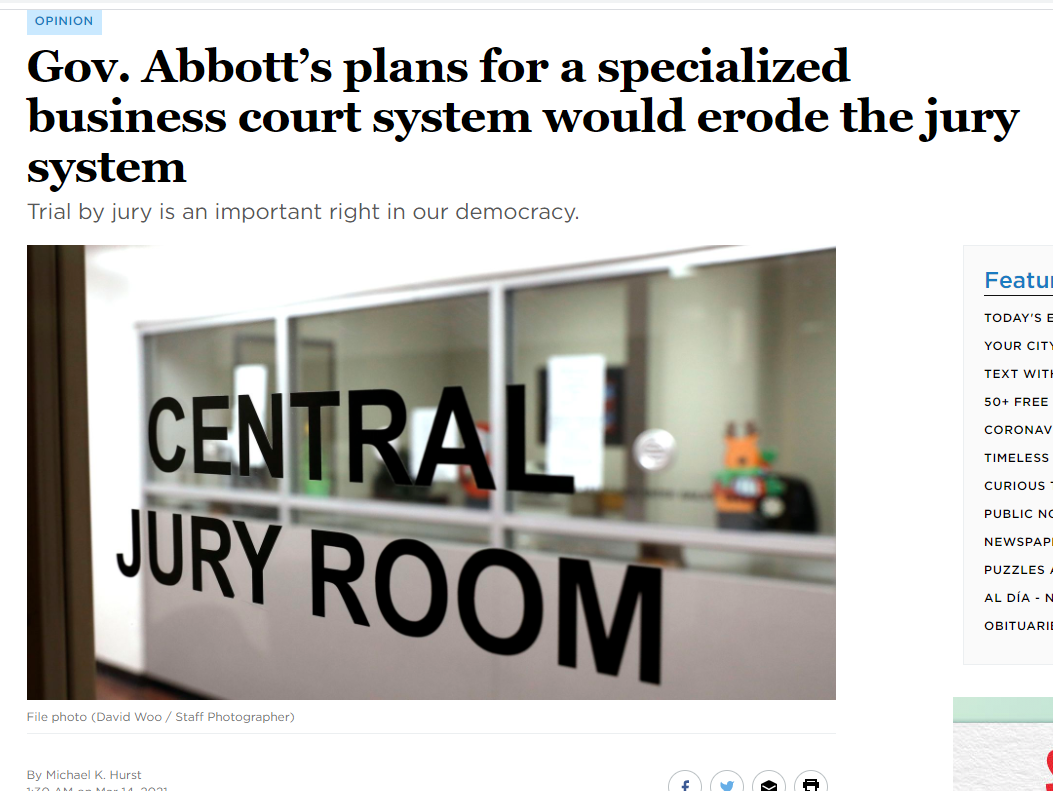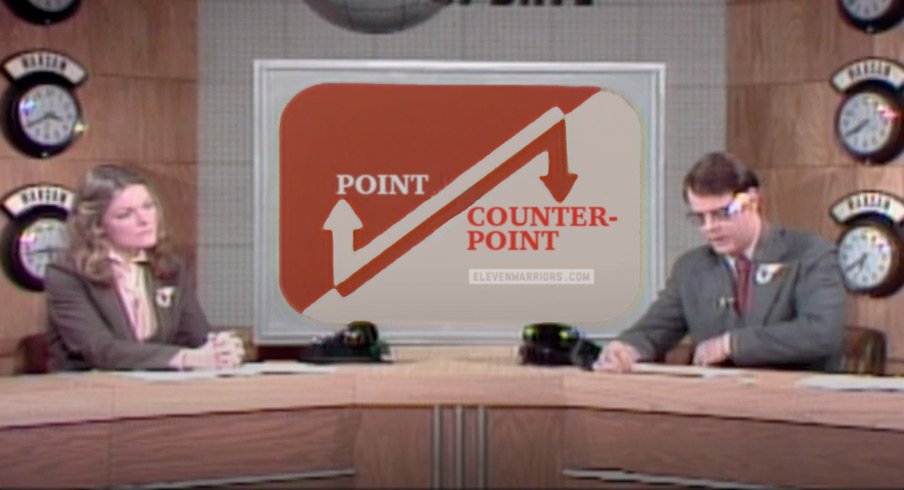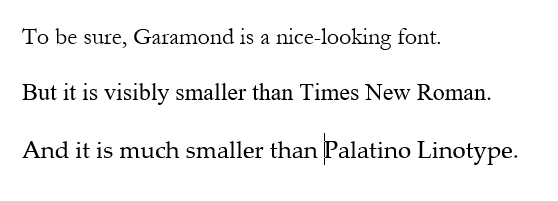Many books and movies involve tales of scary creatures who return, ranging from Grendel’s family in the ancient epic of Beowulf to “Where’s My Mummy?”, an underappreciated part of the Scooby Doo multiverse. The to pic of briefing waiver returns in the majority opinion from Herczeg v. City of Dallas, which found waiver in a sovereign-immunity case because the opening brief did not address untimeliness or exhaustion of remedies. It distinguished St. John Missionary Baptist v. Flakes, 595 S.W.3d 211 (Tex. 2020), as involving “two grounds [that] were not actually independent but were inextricably intertwined,” while here, “untimeliness and failure to exhaust administrative remedies are independent of the City’s other grounds, which focused on the merits of Herczeg’s claims.” A dissent questioned whether the older authority cited by the majority continued to be viable after Flakes. Justice Garcia wrote for the majority, joined by Justice Smith; Justice Schenck dissented. No. 05-19-01023-CV (March 29, 2021) (mem. op.).
pic of briefing waiver returns in the majority opinion from Herczeg v. City of Dallas, which found waiver in a sovereign-immunity case because the opening brief did not address untimeliness or exhaustion of remedies. It distinguished St. John Missionary Baptist v. Flakes, 595 S.W.3d 211 (Tex. 2020), as involving “two grounds [that] were not actually independent but were inextricably intertwined,” while here, “untimeliness and failure to exhaust administrative remedies are independent of the City’s other grounds, which focused on the merits of Herczeg’s claims.” A dissent questioned whether the older authority cited by the majority continued to be viable after Flakes. Justice Garcia wrote for the majority, joined by Justice Smith; Justice Schenck dissented. No. 05-19-01023-CV (March 29, 2021) (mem. op.).
Monthly Archives: March 2021
 A common sci-fi movie trope is the image of a “mad scientist” working in the laboratory. Texas appellate lawyers and judges have a similar look when applying Crown Life Ins. Co. v. Casteel, 22 S.W.3d 378 (2000), which deals with the vexing problem of jury charges that mix valid and invalid elements. The Fifth Court’s majority opinion in Kansas City Southern Ry. Co. v. Horton, No. 05-19-00856-CV (March 11, 2021) (mem. op.), after finding one of the plaintiffs’ two liability theories preempted by federal law, found a Casteel issue with a broad-form negligence submission in a personal injury case. It distinguished an earlier Dallas case and a Corpus Christi decision as involving factual-sufficiency rather than legal-validity issues. A dissent took issue with the holding about preemption.
A common sci-fi movie trope is the image of a “mad scientist” working in the laboratory. Texas appellate lawyers and judges have a similar look when applying Crown Life Ins. Co. v. Casteel, 22 S.W.3d 378 (2000), which deals with the vexing problem of jury charges that mix valid and invalid elements. The Fifth Court’s majority opinion in Kansas City Southern Ry. Co. v. Horton, No. 05-19-00856-CV (March 11, 2021) (mem. op.), after finding one of the plaintiffs’ two liability theories preempted by federal law, found a Casteel issue with a broad-form negligence submission in a personal injury case. It distinguished an earlier Dallas case and a Corpus Christi decision as involving factual-sufficiency rather than legal-validity issues. A dissent took issue with the holding about preemption.
 “’When a trial court’s order does not specify the grounds for its summary judgment, an appellate court must affirm the summary judgment if any of the theories presented to the trial court and preserved for appellate review are meritorious.’ However, when the trial court’s summary judgment order does
“’When a trial court’s order does not specify the grounds for its summary judgment, an appellate court must affirm the summary judgment if any of the theories presented to the trial court and preserved for appellate review are meritorious.’ However, when the trial court’s summary judgment order does
specify a ground on which it was granted, we generally limit our review to that ground.
Here, because the trial court’s summary judgment order specified the ground
on which it was granted—that Finley was a released party because the term
‘predecessor’ in the Release includes an entity that was a ‘predecessor in title’ to
the subject property interest—we will limit our review to that theory.” Headington Royalty v. Finley Resources, No. 05-19-00291-CV (March 18, 2021) (citations omitted) (emphasis added).
This is a cross-post from 600Camp, which follows commercial litigation in the Fifth Circuit.
The DC Circuit’s recent style manual amendment that criticized the use of “Garamond” font has drawn national attention. As this matter has now become a pressing issue facing the federal courts, 600Camp weighs in with these thoughts, all of which are written in 14-point size:
Accordingly, if you really like Garamond and are writing a brief with a word limit rather than a page limit, you should consider bumping the size up to 15-point. And of course, in a jurisdiction with page limits rather than word limits, Garamond offers a way to add more substance to your submission–but be careful that this extra substance does not come at the price of less visibility.
The Fifth Court rejected an argument that a supreme court emergency order extended the trial court’s plenary power after a case’s dismissal: “[T]he language in the emergency orders ‘giving a court the power to modify or suspend “deadlines and procedures” presupposes a pre-existing power or authority over the case or the proceedings. . . . It does not suggest that a court can create jurisdiction for itself where the jurisdiction would otherwise be absent[.]’ Here, the trial court lost jurisdiction over the case on July 20, and the motion to reinstate was not filed until November. Because the trial court lacked jurisdiction over the case by the time the motion to reinstate was filed, it could not avail itself of the emergency order to reinstate the case, and the challenged orders are void.” Quariab v. Khalili, No. 05-20-00979-CV (March 15, 2021) (mem. op.) (citing In re State ex rel. Ogg, No. WR-91,936-01, 2021 WL 800761, at *3 (Tex. Crim. App. Mar. 3, 2021)).
 “Texas law provides district court judges with ‘the power to
“Texas law provides district court judges with ‘the power to
issue writs necessary to enforce their jurisdiction.’ While the Taxing Entities urge the Post Judgment Order falls within this power to ‘enforce’ the judgment, they fail to explain how an order withdrawing part of the relief afforded by the judgment would amount to ‘enforcement’ or be available to a party after expiration of the trial court’s plenary power other than by appeal.” NMF Partnership v. City of Dallas NMF Partnership v. City of Dallas, No. 05-19-01578-CV (March 17, 2021) (mem. op.) (citations omitted).
 The issue: “[W]hether the word ‘predecessors’ in the Release’s phrase “[Headington] waives, releases, acquits and discharges Petro Canyon and its affiliates and their respective officers, directors, shareholders, employees, agents, predecessors and representatives for any liabilities, claims, . . . [and] causes of action . . . related in any way to the Loving County Tract” refers to (i) Petro Canyon and its affiliates’ corporate entities and agents (‘Players’) or (ii) prior parties in Petro Canyon’s chain of title (‘Spectators’) that are otherwise unrelated to Petro Canyon.”
The issue: “[W]hether the word ‘predecessors’ in the Release’s phrase “[Headington] waives, releases, acquits and discharges Petro Canyon and its affiliates and their respective officers, directors, shareholders, employees, agents, predecessors and representatives for any liabilities, claims, . . . [and] causes of action . . . related in any way to the Loving County Tract” refers to (i) Petro Canyon and its affiliates’ corporate entities and agents (‘Players’) or (ii) prior parties in Petro Canyon’s chain of title (‘Spectators’) that are otherwise unrelated to Petro Canyon.”
Held: “‘[P]redecessors’ is in a string of entity-related groups (‘Players’), not chain of title-related owners of the real property interest (‘Spectators’). Excluding ‘predecessor,’
each of those other terms in the Release relate as ‘birds of a feather’ to the corporate
composition or structure of Petro Canyon and its affiliates. The placement of the
term ‘predecessors’ along with its ordinary meaning gives the term a certain legal
meaning.”
Dissent: “The majority’s interpretation of the term “predecessors” in the Release fails to acknowledge the context of the circumstances surrounding the PCH Agreement, including the events leading to its formation, the relationships of the parties, each party’s motivations for entering the agreement, and the intentions of the parties as expressed in the agreement. The majority’s interpretation of the Release also impermissibly adds language to the Release, and the majority opinion conflicts with this Court’s prior opinions.” Headington Royalty v. Finley Resources, No. 05-19-00291-CV (March 18, 2021).
 My colleague Michael Hurst wrote an insightful op-ed in the Dallas Morning News about a proposed system of specialized business courts for Texas. He questions whether it fits well with constitutional guaranties of the right to jury trial.
My colleague Michael Hurst wrote an insightful op-ed in the Dallas Morning News about a proposed system of specialized business courts for Texas. He questions whether it fits well with constitutional guaranties of the right to jury trial.
 In Anubis Pictures LLC v. Selig, a dispute about the development of a screenplay, two terms from an early-stage NDA were key to resolving it:
In Anubis Pictures LLC v. Selig, a dispute about the development of a screenplay, two terms from an early-stage NDA were key to resolving it:
As to the parties’ relationship: “Neither party is bound to proceed with any transaction between the parties unless and until both parties sign a formal, written agreement setting forth the terms of such transaction. At any time prior to the completion of such a formal, written agreement, either party may terminate the Discussions and refuse to enter into any subsequent transaction, for any reason or for no reason, without liability for such termination, even if the other performed work or incurred expenses related to a potential transaction in anticipation that the parties would enter into a formal, written agreement regarding such transaction.”
As to the documents shared: “To be covered under the terms of the NDA, confidential information disclosed in written form was required to be marked confidential on its face. Any oral statement intended to be confidential had to be clearly designated as such by the disclosing party.” No. 05-19-00817-CV (March 3, 2021) (mem. op.).
 The Fifth Court denied mandamus relief in a dispute about third-party document confidentiality, observing that the party resisting discovery (1) “relied, in part, on a non-disclosure agreement that by its very terms expired years before the documents were subpoenaed and produced.” and (2) “relied on the affidavit of the President of one of [the movant’s] portfolio companies, which contains conclusory allegations concerning the confidential nature of [its] business and strategies, and of potential harm. Those assertions, in and of themselves, are not dispositive of the objection to confidentiality.” In re Edelman, No. 05-21-00085-CV (March 5, 2021).
The Fifth Court denied mandamus relief in a dispute about third-party document confidentiality, observing that the party resisting discovery (1) “relied, in part, on a non-disclosure agreement that by its very terms expired years before the documents were subpoenaed and produced.” and (2) “relied on the affidavit of the President of one of [the movant’s] portfolio companies, which contains conclusory allegations concerning the confidential nature of [its] business and strategies, and of potential harm. Those assertions, in and of themselves, are not dispositive of the objection to confidentiality.” In re Edelman, No. 05-21-00085-CV (March 5, 2021).
A dissent concluded that one of the documents was protected by Texas’s shield statute, observing: “[The interest implicated by Exhibit M is not merely proprietary but also appears to concern a recurring relationship between a media relations firm and a news reporter, the disclosure of which would directly implicate the journalist’s news gathering rights.”
 A group of investors (“FPH”) in a business (“FSG”) sought the appointment of a receiver to review and report on the finances of FSG. The trial court (1) agreed, and then (2) allowed FSG to supersede the order with a $10,000 bond while it took an interlocutory appeal, but then (3) allowed FPH to post a “counter-supersedeas bond” of $11,875 so that the receiver’s work could proceed during the interlocutory appeal. The Fifth Court found that “[TRAP] 24.2(a)(3) expressly permitted the trial court to allow FPH to post a counter-supersedeas bond,” and then found the bond amount to be appropriate in light of “[t]he fact that FSG continues to have sole control of its management” and the evidence presented about FSG’s financial situation. Five Star Global, LLC v. Hulme, No. 05-20-00940-CV (March 2, 2021).
A group of investors (“FPH”) in a business (“FSG”) sought the appointment of a receiver to review and report on the finances of FSG. The trial court (1) agreed, and then (2) allowed FSG to supersede the order with a $10,000 bond while it took an interlocutory appeal, but then (3) allowed FPH to post a “counter-supersedeas bond” of $11,875 so that the receiver’s work could proceed during the interlocutory appeal. The Fifth Court found that “[TRAP] 24.2(a)(3) expressly permitted the trial court to allow FPH to post a counter-supersedeas bond,” and then found the bond amount to be appropriate in light of “[t]he fact that FSG continues to have sole control of its management” and the evidence presented about FSG’s financial situation. Five Star Global, LLC v. Hulme, No. 05-20-00940-CV (March 2, 2021).
Gharavi owned a business that won an arbitration against Khademazad. Gharavi sued to enforce the award, and along the way, made a comment about Khademazad and the award on Yelp. The parties resolved their differences and entered a settlement agreement of the lawsuit about the award, in which Khademazad released all claims “directly or indirectly attributable to the transaction or occurences made the basis of this lawsuit.” Several weeks later, Khademazad sued for libel and similar claims based on the Yelp post. The Fifth Court found that this suit was barred by the release: “Without question, the Yelp review was, if not directly, then indirectly attributable to Khademazad’s failure to pay for Aidris’s services and the lawsuit that followed. Khademazad’s claims here are clearly within the subject matter of the release.” Gharavi v. Khademazad, No. 05-20-00083-CV (Feb. 2, 2021) (mem. op.).
